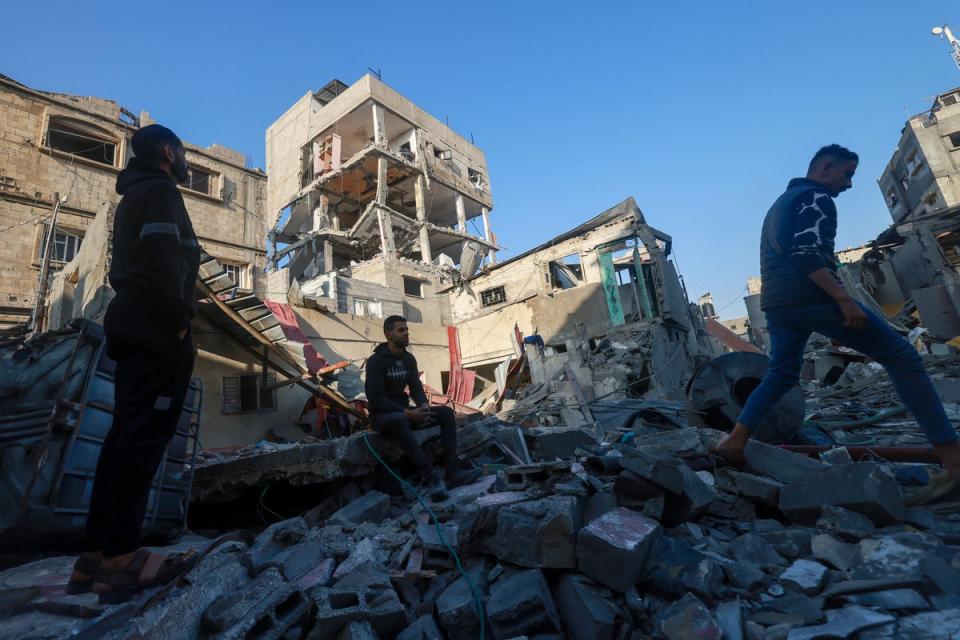Infectious disease spreading rapidly through southern Gaza, doctors warn
Doctors in southern Gaza have warned that infectious diseases are spreading rapidly through the territory, due to overcrowding caused by the mass evacuation of civilians as Israel’s military campaign moves south.
Asem Mohammed, 24, a volunteer doctor at Nasser Hospital in Khan Younis, told The Independent the area surrounding the hospital was “full of infectious diseases and epidemiological issues”, including “fungal infections”, “dermatological infections” and “pneumonia”.
Khan Younis has become the main target of Israeli military operations in the three days since hostilities restarted, after the end of the week-long truce that saw over 100 hostages and 240 Palestinian prisoners released.
“The situation right now inside the hospital is catastrophic,” Yousef Adnan, 24, a volunteer doctor at Nasser Hospital, told The Independent. “We are treating thousands of cases of diarrhoea due to the lack of access to clean water.”
In addition to treating disease, doctors are dealing with a renewed flow of victims of Israeli airstrikes, which have centred on Khan Yunis in recent days.
Witnesses inside the hospital described seeing pools of blood on the floor, with doctors stepping over dead bodies as they moved from case to case.
After a team from the World Health Organisation visited Nasser Hospital on Saturday, WHO director-general Tedros Adhanom Ghebreyesus described the conditions there as “unimaginable”.
“Patients were receiving care on the floor, screaming in pain,” he wrote on X, formerly Twitter.

The area around the hospital has become a makeshift camp for people who have been forced to flee their homes since the war began. In recent days they have been joined by residents from nearby neighbourhoods in Khan Younis, who have fled there for safety.
The severe overcrowding has created optimal conditions for the spread of disease – which is compounded by a lack of medical supplies, limited access to clean water, and poor sanitation.
As of 29 November, the WHO had recorded 85,899 cases of diarrhoea, 2,335 cases of chickenpox, 24,355 cases of skin rashes, 116,829 cases of acute respiratory infections, 25,456 cases of scabies and lice, and 1,150 cases of jaundice throughout Gaza.
Cases of diarrhoea among children aged five and older were more than 100 times normal levels across Gaza in early November.
On Wednesday, WHO spokesperson Dr Margaret Harris warned: “Eventually, we will see more people dying from disease than we are even seeing from the bombardment, if we are not able to put back [together] this health system."
“The situation is getting worse and worse,” said Mr Mohammed.
As the war continues, a key concern for humanitarian groups working in Gaza is the spread of lethal water-borne diseases such as cholera and typhoid.
Local doctors have described how a lack of essential vaccines for newborn babies allowed disease to spread faster through hospitals. They have noted an increase in hospital-acquired pneumonia.
On Sunday, Israel ordered the evacuation of five more areas in and around Khan Younis, dropping flyers ordering residents to move towards Rafah. “Khan Younis is a dangerous combat zone,” read leaflets dropped over the area by Israeli warplanes.
Throughout the day, Israeli bombs continued to pound the city.
The pattern of Israel Defence Forces operations has led to expectations that Israel is preparing for a ground invasion in the south of the territory.
This has caused concern that the prospects of a renewed ceasefire are moving further and further away. On Saturday, the deputy chief of Hamas, Saleh al-Arouri, reportedly told Al Jazeera that no further hostages would be released until a new ceasefire is agreed.
The statement came as Israeli prime minister Benjamin Netanyahu ordered Mossad negotiators to leave Qatar and withdraw from talks over a new ceasefire.
Elsewhere, the ripple effects of the war continued to play out globally.
The British government announced it would send surveillance planes to conduct operations over the Mediterranean, including Israel and Gaza.
“Surveillance aircraft will be unarmed, do not have a combat role, and will be tasked solely to locate hostages. Only information relating to hostage rescue will be passed to the relevant authorities responsible for hostage rescue,” it said in a statement on Saturday.
“The safety of British nationals is our utmost priority,” the Ministry of Defence said.

